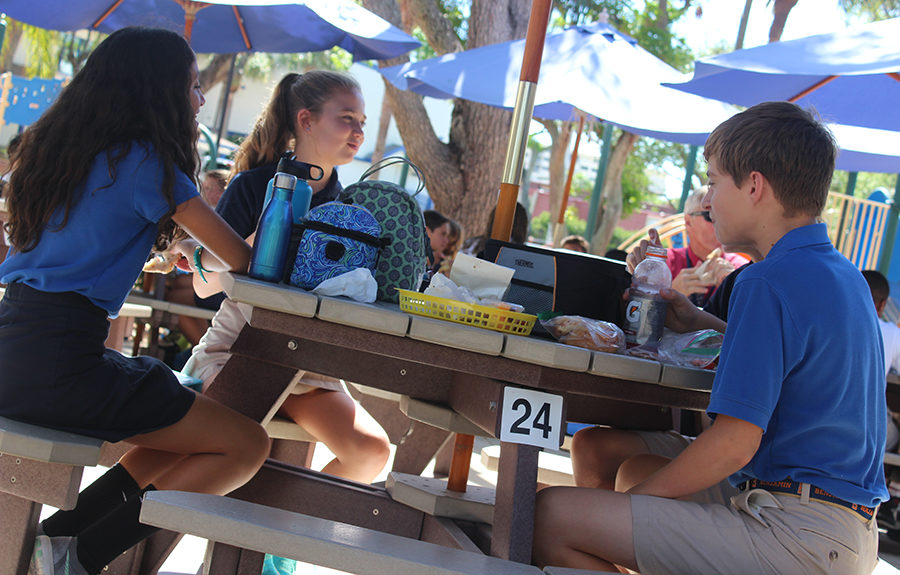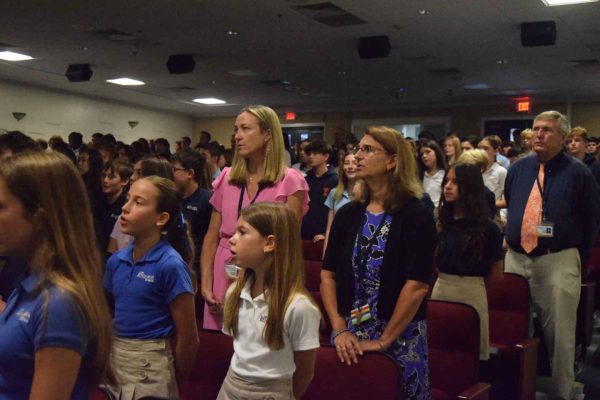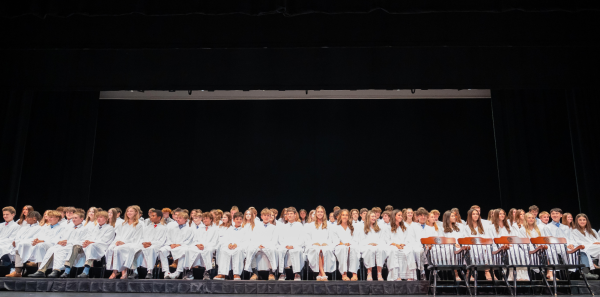The Reasoning Behind Assigned Seating at Lunch
Left to right: Seventh graders Sophie Marx, Skylar Malmberg, and William Harris sit at their assigned table during lunch. The tables in the sixth and seventh-grade areas have numbers affixed to them and students must sit at their assigned tables per groupings handed down from the administration.
What do taking a test, fighting with a friend, wondering if your crush likes you, and going to lunch have in common? According to familyeducation.com, a website dedicated to providing helpful resources for parents, these are the most stressful aspects of the day for middle school students. Here at Benjamin, though, students have one less thing to worry about thanks to Head of School Mr. Charles Hagy and Dean of Students Mr. Jeffery Cavallo. By assigning lunch tables to sixth and seventh grades, no student has to worry about fitting in or finding a place to sit. While other schools may also employ assigned seating at lunch, few middle school headmasters have done as much research on the topic as Hagy.
“Everything that goes on in school is a curricular activity,” Hagy said. “You just have instructional time, and you have non-instructional time. We found that at the middle school grade levels, the most stressful times of the day, for many kids, were those non-instructional times. One of them – lunch time.”
Hagy wants to make sure that students are safe, comfortable, and respected throughout the school day, even if it is not during instructional time. “There is great consternation, confusion, [and] fear about who I am going to sit with at lunch. The bigger question is, ‘Do I belong?’ Middle schools exist to habituate positive habits. I want the kids to feel safe as if they belong.”
Just like Mr. Hagy, seventh grader Owen Nutter believes assigned seating is necessary. “I believe that [assigned lunch seating] makes people unite with people that they never thought they would meet,” said Nutter, who joined Benjamin as a sixth grader. “It’s a great way to socialize.”
Despite what Nutter says, other students think that assigned seats should not be a part of the regular school day.
“Lunch is the only time where you can see your friends, and the assigned lunch takes that away,” said seventh grader Tyler Bedoya. Fellow seventh grader Angelina Calvo-Ayers thinks that seventh graders are being treated as if they are immature. “[Seventh graders] are old enough to pick who [they want] to sit with,” she said. Many sixth graders also share the same thoughts as their seventh-grade counterparts. “Since there [are] a bunch of friends that I don’t usually have classes with and since they’re not at my table, I usually don’t get to hang out with them [at school],” said sixth grader Claire Dinh. “I don’t really like [assigned lunch seating.]”
Eighth graders don’t have assigned seating and are allowed to sit with whom they want at lunch, which may be another reason why the younger students see it as unfair. However, Mr. Cavallo thinks the assigned seating is necessary for both the sixth and seventh grade. “Sixth graders coming in new to the middle school have a lot of changes,” said Cavallo. “They have lockers for the first time, they are responsible for understanding combinations, they now have to go from class to class without a teacher which they’re totally unaccustomed to. For the sixth graders it’s an easier way to remove as much stress as possible because there are so many changes.”
And the seventh graders? “I personally feel like seventh grade is the most challenging year,” said Cavallo. “You’re not the eighth grader, king and queen of the hill, and you’re not a newcomer, just totally shocked with everything in the middle school. We do have a lot of students that come to the middle school in seventh grade. This way, any new students that come, they know that they have a place to sit every single day.”
According to Cavallo, if the students follow the character traits that the Benjamin School lives by, then the assigned seating will come to an end at some point during the year.
“We will back off as they show to us that they can care for each other, [and show that] they are responsible enough,” said Cavallo. “[If this happens], we can diminish the assigned seating.”
Despite the fact that many students don’t enjoy the assigned seating, Cavallo thinks it benefits students in the long run. “It [teaches] a life skill,” he said. “When you go to the Upper School, and then when you go on to college, you’re going to have to have that life skill of speaking with people and meeting with people [you don’t know very well].”
From that perspective, students shouldn’t view assigned seating as a punishment to keep them from their friends, but as an opportunity to build relationships and community with others. It also provides them with a set of social skills they can use throughout their lives to meet new people and make new friends.






bob • Apr 10, 2019 at 4:19 pm
why so short
Mckenzie • Dec 5, 2018 at 12:52 pm
I just have a few questions. How do you assign the seats, do you do it by last name or by who gets along with who? And also do you mix boys and girls equally on a table or do you have a girl table and a boy table?